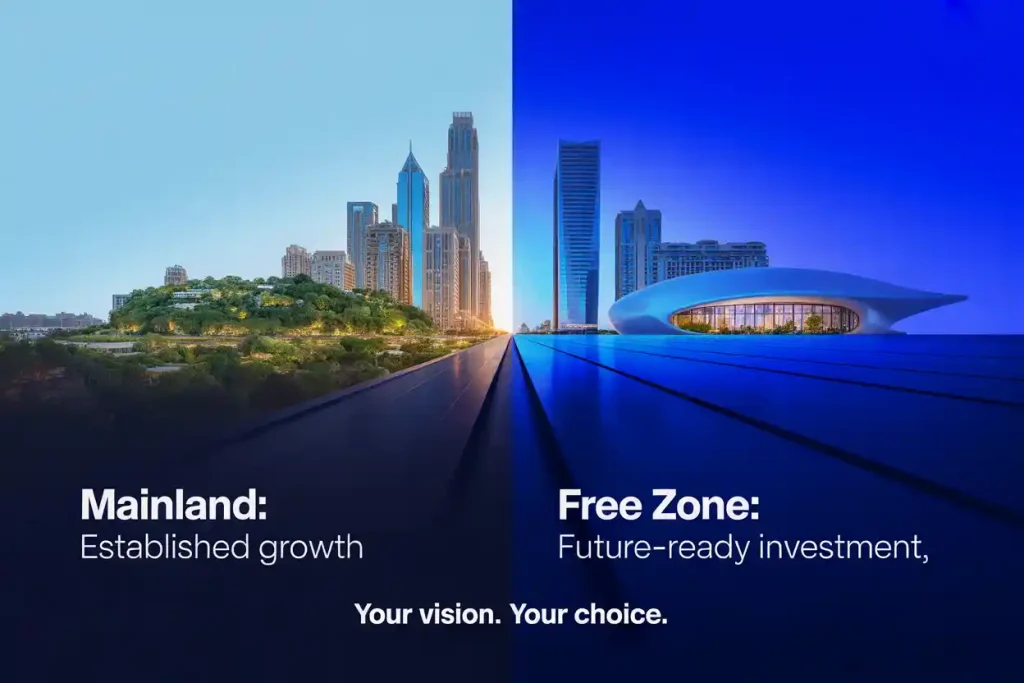When starting a business in the UAE, one of the first (and most important) decisions you’ll make is choosing between a Mainland setup or a Free Zone setup.
Both offer unique benefits and both can be the right choice, depending on your goals, budget, and business model.
In this guide, we’ll break down Mainland vs Free Zone in simple terms, compare costs and benefits, and help you decide which gives better value for your investment in 2025.
What’s the Main Difference Between Mainland and Free Zone?
Short answer:
- Mainland companies are licensed by the Department of Economic Development (DED) and can operate anywhere in the UAE and internationally.
- Free Zone companies are licensed by specific free zone authorities and generally operate within that zone or internationally (with restrictions in the UAE mainland).
Expanded explanation:
- Mainland: You can do business with any company in the UAE without restrictions. Great for B2B, retail, and service-based businesses targeting the local market.
- Free Zone: You enjoy 100% foreign ownership, tax benefits, and streamlined processes, ideal for international trading, tech startups, or businesses that don’t need a physical UAE mainland presence.
1. Ownership Rules – Who Really Owns Your Business?
- Mainland:
- Since recent law changes, many business activities now allow 100% foreign ownership in the mainland.
- Some strategic sectors still require a local Emirati partner.
- Free Zone:
- Always allows 100% foreign ownership, regardless of activity.
Winner: If ownership control is your priority, Free Zone guarantees it without exceptions, but Mainland is now competitive for many activities.
2. Cost Comparison – Where Do You Save More?
| Cost Element | Mainland | Free Zone |
|---|---|---|
| License Fees | AED 10,000 – AED 15,000+ | AED 6,000 – AED 15,000+ |
| Office Space | Mandatory physical office | Flexible (shared desk options) |
| Visa Quota | Depends on office size | Limited, can be increased |
| Renewal Fees | Slightly higher | Often lower |
Key insight:
- Free Zones can be more budget-friendly for startups, especially if you choose flexi-desk options.
- Mainland has higher initial costs but may offer better long-term market access.
[ Note: Startup Works Offers Packages from 4,999 AED ]
3. Market Access – Who Can You Sell To?
- Mainland: No restrictions, you can trade directly with the UAE market.
- Free Zone: Direct trading with the mainland requires a local distributor or opening a mainland branch.
Example:
If you’re opening a marketing agency targeting Dubai-based clients, Mainland will save you the hassle of hiring a local agent.
If you’re running an online store selling globally, Free Zone may be more cost-effective.
4. Office & Location Requirements
- Mainland:
- Must lease an office or retail space in the mainland.
- Size determines your visa quota.
- Free Zone:
- Many offer flexible workspace solutions, including shared desks and virtual offices.
- Ideal for businesses without heavy staff requirements.
5. Taxes & Incentives
- Mainland:
- Subject to UAE’s corporate tax (9% for profits over AED 375,000).
- VAT applies if your revenue exceeds AED 375,000 annually.
- Free Zone:
- Many zones offer 0% corporate tax if you meet qualifying criteria.
- Still must register for VAT if applicable.
Which Offers Better Value for Your Investment?

Choose Mainland if:
- You want to sell directly to UAE customers without restrictions.
- You plan to open a retail shop, restaurant, or physical service location.
- Your business needs government contracts or tenders.
Choose Free Zone if:
- You’re a startup with limited capital.
- Your business is online, international, or doesn’t require a mainland presence.
- You want the easiest path to 100% ownership with minimal setup time.
Quick Comparison Table: Mainland vs Free Zone
| Factor | Mainland | Free Zone |
|---|---|---|
| Ownership | Up to 100% foreign ownership | 100% foreign ownership always |
| Market Access | Anywhere in UAE + international | International + inside zone |
| Costs | Higher setup & office costs | Lower initial costs |
| Office Requirement | Mandatory physical office | Flexible workspace options |
| Licensing Authority | DED | Free Zone Authority |
Common Misunderstandings to Avoid
- “Free Zone means no business in the UAE mainland” – You can work with mainland clients, but only via a local agent or branch.
- “Mainland always requires a local partner” – Not true for many activities after recent law changes.
- “Free Zone is always cheaper” – Some high-demand free zones can cost as much as mainland setups.
FAQs – Mainland vs Free Zone
Q1: Can I switch from Free Zone to Mainland later?
Yes, but it involves license cancellation and new setup, costs and processes vary.
Q2: Which is faster to set up?
Free zones are generally faster, sometimes within a few days. Mainland can take longer due to office lease and inspection.
Q3: Do both require visas?
Yes, both options allow you to apply for investor and employee visas.
Q4: Is it possible to have both?
Yes. Many businesses operate a free zone entity for international trade and a mainland entity for local sales.
Conclusion
Both Mainland and Free Zone setups can offer excellent value, but the “better” option depends entirely on your business goals, budget, and target market.
If your aim is local market dominance, Mainland is the way to go.
If you want low-cost, global flexibility, Free Zone may be your best starting point.
Tip: The smartest investors often consult with experienced UAE business setup consultants before deciding, it can save you time, money, and future headaches.
Ready to choose your business setup path?
Contact Startup Works for a free consultation and get tailored advice for your Business Setup in Dubai based on your business plan.


Leave a Reply